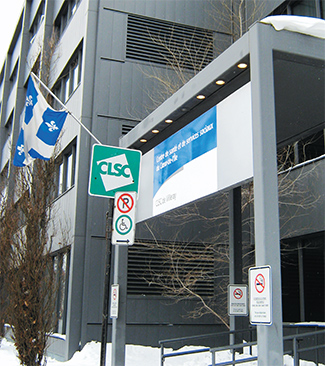Professionals and services
Health professionals
Throughout your pregnancy, you have access to a variety of health professionals who will help care for you and your baby. There is also a whole range of services available that can help you through this important period of your life.
Where to find information about services
Access to health professionals, hospitals and birthing centres, doulas, as well as prenatal classes and activities varies by region. For information about the services available in your area, contact a health professional at a local hospital, clinic, or CLSC.
Health professionals who can provide prenatal care include midwives, obstetrician/gynaecologists, some family doctors, and primary health care nurse practitioners. With the exception of primary health care nurse practitioners, these professionals can also attend deliveries.
In addition, you will be in contact with nurses at your prenatal classes and your CLSC, in medical clinics or hospital high-risk pregnancy clinics (GARE clinics), and during your labour and delivery.
If you’re thinking about giving birth with a midwife at home, at a birthing centre, or in hospital, contact your local CLSC at the start of your pregnancy to find out if midwife services are available in your area.
Many health professionals work as a team. You can ask your health professional how his or her team works and who will be there for the birth of your baby. It is important that you trust and feel supported by your health professional. Feel free to ask even the most basic questions.
You can change healthcare professionals at any time during your pregnancy. If you do so, make sure to have your file transferred so you and your baby receive seamless, quality care.
Other health professionals who are not directly involved in providing prenatal care may also be of help, such as nutritionists, pharmacists, psychologists, social workers, and physiotherapists.
Doulas
Doulas help future parents during pregnancy and delivery. They can provide additional support and information, even if they are not technically health professionals. They can also provide assistance after your baby is born.
If you would like to have a doula, it is important to choose someone you and your partner trust and feel comfortable expressing your needs to during your pregnancy and delivery.
It is best to inform your health professional if you intend to have support from a doula. Keep in mind that doulas often charge for their services. Fees vary by organization and may also depend on your financial resources.
CLSCs

![]() CLSCs offer a variety of services and can also refer you to other organizations.
CLSCs offer a variety of services and can also refer you to other organizations.
Photo: Pascale Turcotte
CLSCs (Centres locaux de services communautaires) are a gateway to health and social services for everyone. They offer a wide range of services to pregnant women and parents. Services may vary by region.
CLSCs can also inform you about the services available in your region. If you have questions regarding your health and well-being, your CLSC can provide answers or refer you to the appropriate service. A few days after the birth, a CLSC nurse may contact you to make sure everything is going well for you and your baby.
Your CLSC works in collaboration with childcare centres known as centres de la petite enfance (CPEs) to provide any help you may need. It also works with community organizations that support families. It can refer you to resources in your community as required.
To find the CLSC in your area
Visit sante.gouv.qc.ca/en/repertoire-ressources/clsc/.
![]() After your baby has arrived, your CLSC can also help you adjust to parenthood by providing access to various services. Contact your CLSC for information on the services available in your area.
After your baby has arrived, your CLSC can also help you adjust to parenthood by providing access to various services. Contact your CLSC for information on the services available in your area.
Info-Santé and Info-Social
Info-Santé and Info-Social are available in most regions throughout Québec. These free, confidential hotline services are provided through the health system. You can talk with a professional specializing in health or psychosocial support at any time of day and night, 7 days a week.
Info-Santé can respond to concerns you may have about your health or that of your baby and give you advice.
Info-Social can respond to your concerns about psychological and social problems and provide support for you or your family (e.g., anxiety, parental roles, couples issues, financial difficulties).
Simply dial 8-1-1 to access these two services.
Info Santé and Info-Social are confidential services. They are available throughout Québec, except in certain remote regions. In these areas, your prenatal care provider will tell you the local number to call.
Prenatal classes
Prenatal classes are designed to answer your questions about things like pregnancy, labour, delivery, breastfeeding, and newborn care. This information is generally provided during group meetings, and fathers or partners are encouraged to attend. Classes are also an opportunity to talk with people who are going through the same things you are.
To find out what is available in your area, ask your health professional or contact your CLSC.
Prenatal activities
Yoga, aerobics, aquafitness, and other classes are great opportunities to have fun, get moving, meet other parents‑to‑be, and obtain useful information during your pregnancy. Many CLSCs and community and private organizations offer activities for expectant mothers.
Approaches, start dates, length, the number of participants, and costs vary from one organization to the next. Some activities are for pregnant women only, while others are open to couples.
To find out what is available in your area, ask your health professional or contact your CLSC.
For more resources, see Resources for parents.
Labour: Process by which the baby passes from the uterus to the outside world, primarily through contractions of the uterus.


